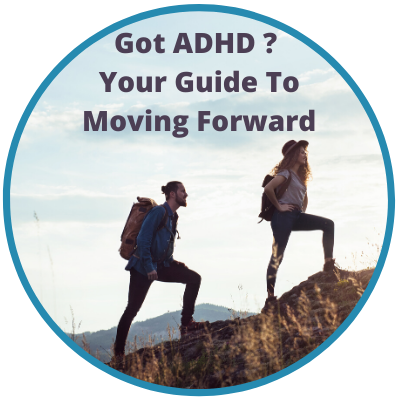|
July 26, 2022

Explaining the Executive Function of Sustained Attention
In case you have just found our website, and this is your first newsletter, let me introduce you to our series on the brain’s Executive Functions and what they are. The Executive Functions are considered our highest level brain processes that guide us through this complex world we inhabit. People with ADHD tend to struggle mightily in particular areas. The research shows that those with ADHD have particular weaknesses in Executive Functions, which can explain the why of those struggles. We use the Peg Dawson and Richard Guare breakdown of the Executive Functions for our discussions, in which they break them down into twelve different processes.
This month’s newsletter will cover the Executive Function of Sustained Attention. This is the ability to push ourselves through to the end of what we have started. The last newsletter looked into the Executive Function of Task Initiation, which was the ability to get started and how we find it difficult to get the ball rolling because of our weak self-generation of motivation. In Sustained Attention, we can struggle to persist in our effort around finishing a task.
To succeed in life means we need to be able to start things and finish them. Therefore, a weakness in this executive function can negatively affect so many areas of our lives.
Here are some common struggles with those who have a weakness in Sustained Attention skills:
-
They have numerous partially completed ventures - somewhere during the process, the person with ADHD has lost interest in this venture or gotten distracted and never returned to complete it.
-
Boredom - this task was boring, so mustering up the energy to start took a lot out of the person. And they just ran out of energy before hitting the finish line.
-
Procrastination - thinking they will feel more motivated to complete this venture at a later time, so they stop.
-
Anxious ruminations about the unfinished business - anxiety is rising while they ponder the unfinished business. Could be worrying about where to start and the length of time to finish.
-
Growing resentment - often, those around us are concerned about these unfinished tasks and begin nagging and applying pressure to finish this task. For the person who started it, the project has become a huge albatross around their neck.
-
Penalties for unfinished work - incomplete work in school will affect your grades, and incomplete production on work can affect your career and money-earning abilities.
So how can we create better strategies to help us finish what we started? Here are a few ideas.
-
Be aware of what in your environment might hinder your focus and working memory. By identifying and eliminating or reducing the distractions in your environment, you lessen the demand load on attention and working memory. For example, I rely heavily on my visual learning style, so I take my work to areas of my office or home that are not too visually stimulating.
- Breaking the tasks into more manageable chunks and working in sprints through the chunks can be helpful. This gives you an opportunity to take a break for some movement and rest your eyes from the intense focus on a particular item. This is where using a Pomodoro type of timer is very helpful to call us back after the break to start our next sprint.
-
Don’t depend on willpower alone to keep you away from your tempting instant gratification sources. The more depleted my brain becomes, the less willpower I will be able to exert. Mute that phone and move it to another room. Hide that Xbox because out of sight can be out of mind. Have your drink and snacks close by so you don’t have to leave the area and get distracted by other more compelling tasks.
- You might find staying at the task is much easier with another person working around you. Body doubling simply means doing a task in the presence of another person. This could be a classmate, family member or friend. You can also find virtual body doubles. Read below in the Cool Resource section to get more information on body doubling. Find a friend or family member with a task, and both of you work together. If you are unable to find a volunteer, perhaps you can go to a public area such as a library and work alongside other patrons. Or use a platform like FocusMate and register to get online with another participant looking for a body double.
- A sound incentive system, or “carrots”, can be of use too. Think about what incentivizes you. It could be an activity or something tangible like food, money, or games. Find your carrot and create a scenario of “first this, then that.”
Attention is seen as the capacity to maintain focus in spite of fatigue, boredom, or when a task is not of interest to us. You will gradually build and strengthen this executive function by engineering your environment inside and outside and pushing yourself through those uncomfortable feelings. Laying a foundation with this skill will build our mastery and open the door to opportunities in the future, whether in our home life or career.

Katherine Jahnke
ADHD Coach | Center For Living Well with ADHD, LLC
More about Katherine
Cool Resource
 In the above article on Sustained Attention, one of the suggestions was body doubling. Body doubling is where the person with attention and procrastination issues would work on potentially difficult tasks alongside another person. That body double acts as the anchor to the present moment and task, which helps the inattentive person stay on task and avoid other distractions or temptations. The body double can model sustained attention and even help model calmness to the other person if they are feeling anxious or frustrated. In the above article on Sustained Attention, one of the suggestions was body doubling. Body doubling is where the person with attention and procrastination issues would work on potentially difficult tasks alongside another person. That body double acts as the anchor to the present moment and task, which helps the inattentive person stay on task and avoid other distractions or temptations. The body double can model sustained attention and even help model calmness to the other person if they are feeling anxious or frustrated.
Focusmate is a great tool for body doubling when you can’t find a partner available. You tell them when you want to do a work session and they pair you with one or more others who are looking for a body double.
Focusmate’s website has an area explaining the science behind the platform. It’s fascinating information on how humans are hardwired to respond to behavioral triggers which work to stimulate the release of chemical compounds in the brain.
Here are the five behavioral triggers to achieve a flow state that Focusmate integrates:
-
Pre-commitment - making a commitment to a task or goal in advance of the time when the steps toward that commitment will have to be carried out.
-
Implementation Intentions - these are specific and tangible plans for how you will executive a given objective. You know what to do and how you will do it.
-
Social Pressure - the application of heightened demands on oneself when in the presence of others, in theory so as to fulfill certain implicit and explicit expectations and achieve social acceptance.
-
Accountability - reflects the potential for consequences when failing to comply with a given agreement. In a broad sense it is being held responsible to address the impact of one’s actions. It is not punitive or judgmental - it’s simply creating a cause and effect relationship between an action and its consequences.
-
Specificity in Task Definition - refers to the concreteness of that task definition. The actions involved in well-specified tasks are described and can therefore be quickly visualized and then carried out. Across goal studies, 90 percent show a significant, positive impact on productivity when setting specific and challenging goals.
So whether you incorporate a friend to body double with you in person or you use Focusmate, you can see how behavioral triggers work to help us get stuff done in a timely way with less of a struggle. If you struggle with getting stuff done, this could be the tool to combat procrastination.
Upcoming Events

Brilliant Me & ADHD For Teens and Tweens Workshop Series
- Straight Talk on ADHD - August 3rd
- Leaning on Your Strengths - August 4th
- Building Essential Skills - August 5th
- Managing Emotions and Mindset - August 9th
- Dealing with Procrastination - August 10th
- The Big Review and Celebration - August 11th
Sessions are at 5 pm ET, 4 pm CT, 3 pm MT, 2 pm PT
Read more about this Workshop Series
Got ADHD, Now What? Free Masterclass!
Are you feeling a bit overwhelmed or unsure of the next steps for managing ADHD? In this masterclass, you will:
-
Learn more about the multi-faceted approaches for effectively managing ADHD.
- Explore what your next steps will be.
- Ask questions of our coaches in the Q&A time
- Receive encouragement and support in our private
Read more about this Masterclass Opportunity
Meet Our Team

Learn More About Our Coaches &
Schedule a Complimentary Get Acquainted Session
©2022 Center for Living Well with ADHD · All Rights Reserved
Visit Our Website
|